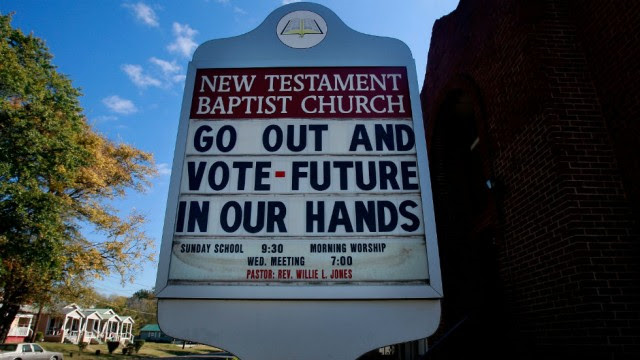
The religious right, with a big boost from President Donald Trump, is close to effectively ending a 63-year-old law banning churches from endorsing or opposing political candidates. House Republicans have quietly inserted into a spending bill a provision that limits the Internal Revenue Service’s ability to investigate religious organizations for violating the law. Since 1954, under a provision championed by then Senator Lyndon B. Johnson, known as the Johnson Amendment, nonprofits, including churches, universities and foundations can lose their tax-exempt status if they engage in overt political activity. The Johnson Amendment has been particularly irksome to conservative religious movements, especially evangelicals, who have been gaining clout since the late 1970s.
Republican White House hopefuls have for years eagerly courted the evangelical vote. Clergy are permitted to preach on issues of concern and churches can issue voter guides that offer views on issues. Trump has continued to vigorously court the religious constituency. In an interview with Pat Robertson of the 700 Club TV program, the president said he’s been a boon to the evangelicals who supported him because “I’ve gotten rid of the Johnson Amendment” and “now we’re going to go try and get rid of it permanently in Congress.”
He didn’t exactly get rid of it, but he’s getting close. In May, Trump signed an executive order that aimed to give churches more ability to speak out politically. Evangelicals criticized his action as too vague. Republicans in the House are trying to correct that. They’ve included language in a must-pass spending bill for the fiscal year beginning October 01.
The provision would prevent the Internal Revenue Service from investigating a church unless the IRS commissioner signs off and notifies Congress. “Why should ministers, whether they be in a synagogue or a church, or any other place of worship, have their freedom of thought and speech suppressed?” asked Rep. John Culberson, R-Texas, who worked to include the language in the bill. “Frankly, it’s offensive for the IRS to try to squelch the thought or political speech of a pastor or minister,” Culberson said.
Mark Harris, senior pastor of the First Baptist Church of Charlotte, N.C., called the measure to weaken the Johnson Amendment “a step in the right direction” though he would prefer that it be repealed. Harris has participated in Pulpit Freedom Sunday, an initiative begun in 2008 by the Alliance Defending Freedom, a conservative nonprofit group, in which pastors take to the pulpit to protest the Johnson Amendment.
Richard Land, president of the Southern Evangelical Seminary near Charlotte, N.C., said, “I think this will help thaw out the chilling effect that this has on freedom of speech for churches and religious groups, a chilling effect aided and abetted by liberal and progressive groups who use the Johnson amendment to intimidate conservative Christians, Protestant and Catholics, from expressing their views on public policy issues.” Not all faith leaders agreed. A group of more than 100 faith organizations sent a letter to the appropriations committee leaders opposing the change. “Weakening current law would allow politicians and others seeking political power to pressure churches for endorsements, dividing congregations and opening them up to the flow of secret money,” they wrote.
It may not be seen clearly that repealing or changing the Johnson Amendment will lead to the unity of church and state, but any true student of Bible prophecy can see that this will bring them much closer together, particularly if restrictions on the use of church money for political campaigns is permitted.
“The dignitaries of church and state will unite to bribe, persuade, or compel all classes to honor the Sunday. The lack of divine authority will be supplied by oppressive enactments.” The Great Controversy, page 592.
